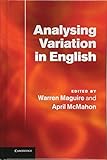Analysing Variation in English / edited by Warren Maguire and April McMahon.
Τύπος υλικού: ΚείμενοΛεπτομέρειες δημοσίευσης: Cambridge ; New York : Cambridge University Press, 2011.Περιγραφή: xiii, 332 σ. : εικ. ; 24 εκISBN:
ΚείμενοΛεπτομέρειες δημοσίευσης: Cambridge ; New York : Cambridge University Press, 2011.Περιγραφή: xiii, 332 σ. : εικ. ; 24 εκISBN: - 9780521898669
- 427.007 2 22
| Τύπος τεκμηρίου | Τρέχουσα βιβλιοθήκη | Ταξιθετικός αριθμός | Αριθμός αντιτύπου | Κατάσταση | Ημερομηνία λήξης | Ραβδοκώδικας |
|---|---|---|---|---|---|---|
![Book [21] Book [21]](https://library.upatras.gr/nereus/nereus-book-yes.png) Book [21]
Book [21]
|
ΒΚΠ - Πατρα Βασική Συλλογή | 427.007 2 ANA (Περιήγηση στο ράφι(Άνοιγμα παρακάτω)) | 1 | Διαθέσιμο | 025000294460 |
Περιλαμβάνει βιβλιογραφικές παραπομπές (σ. 284-322) και ευρετήριο.
Introduction April McMahon and Warren Maguire; Part I. Investigating Variation in English: How Do We Know What We Know?: 1. Collecting data on phonology Erik R. Thomas; 2. How to make intuitions succeed: testing methods for analysing syntactic microvariation Isabelle Buchstaller and Karen Corrigan; 3. Corpora: capturing language in use Alexandra D'Arcy; 4. Hypothesis generation Hermann Moisl; 5. Quantifying relations between dialects Warren Maguire and April McMahon; 6. Perceptual dialectology Chris Montgomery and Joan Beal; Part II. Why Does it Matter? Variation and Other Fields: 7. Variation and linguistic theory Patrick Honeybone; 8. Variation and change Gregory R. Guy; 9. Variation and forensic linguistics Frances Rock; 10. Variation and identity Emma Moore; 11. Variation and populations Rob McMahon; 12. Variation and education Graeme Trousdale.
"Analysing Variation in English brings together a range of perspectives on the collection, analysis and broader relevance of variable language data. In the first half of the book, the focus is firmly on the description and comparison of methods for collecting and analysing examples of variation in language. Novel quantitative and computational methods are introduced and exemplified alongside more traditional approaches. The innovative second half of the book establishes and tests the relevance of language variation to other aspects of linguistics such as language change, and to other disciplines such as law and education. Each chapter concludes with a 'Where next?' section, providing guidance on further reading, but also pointers to under-researched areas, designed to help identify good topics for projects and dissertations. Designed to be used by students as well as researchers, the book will be welcomed by those working in English language and linguistics, sociolinguistics or language change"--


